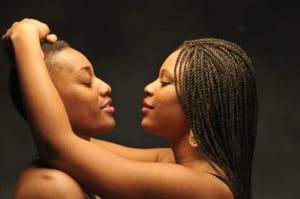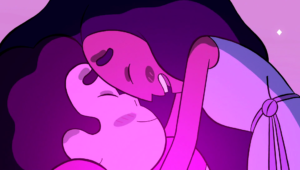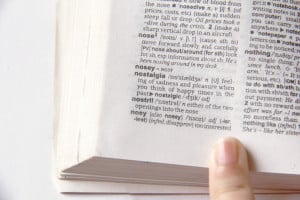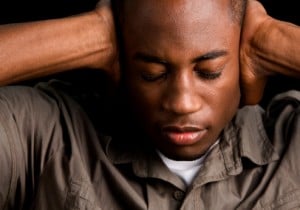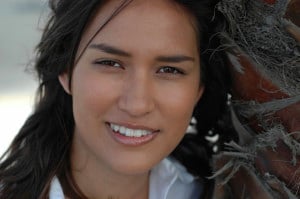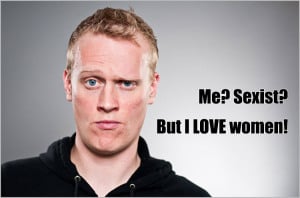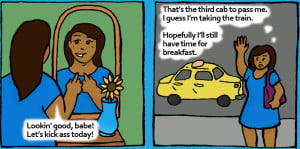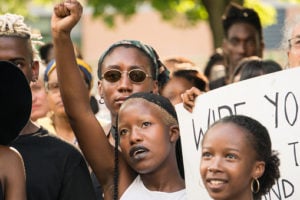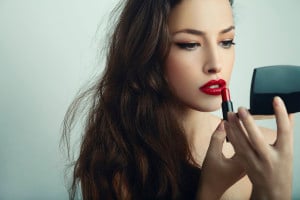
A person with long hair holding a compact mirror and applying red lipstick.
“He’s nice, but you know you could do better,” my friend told me shortly after meeting the person I had just started dating.
I was caught by surprise. The brief introduction had been mutually pleasant, I thought, and definitely nothing egregious enough occurred to prompt such a swift disapproval.
Upon being pressed, my friend replied, “I just think you could be with someone who is more attractive.”
While I personally found the person I was dating attractive (hence dating them), I could understand why someone on the outside might think him less so.
He was considerably larger than me, and his skin wasn’t the smoothest. You probably wouldn’t find him modeling in a fashion magazine – but honestly, I loved his dazzling smile and thickness.
More importantly, he knew how to have fun, was a great caretaker, and had an amazing sense of humor – all things I also find attractive.
But my friend was referencing only physical attractiveness, which, curiously, most of us mean exclusively when we use the term. While there are many things outside of “looks” that attract me to a partner – personality, sense of responsibility, trustworthiness, and so on – even those of us who are familiar with social justice and oppressive beauty standards feel the pull of those standards whether or not we may not agree with them.
The idea that people exist in “leagues” that are defined not just by how we look, but how well our looks stack up against social standards, and that we must stay within those leagues is not novel.
The world is constantly sending messages that our position on a beauty scale set up by oppressive systems makes us more or less worthy of receiving love, and it’s hard not to buy into that message.
I didn’t believe my partner was “not attractive enough” for me, but I still understood that there were people whom I had dated in the past who met more of society’s beauty standards.
Folks with “fit” bodies. “Good” skin. Positioned firmly into masculinity.
It wasn’t until I accepted that desire has political implications that I began to ask myself questions like: why are these standards so important in choosing a partner that “better” could be so easily understood to mean societally recognized as attractive? Why did my friend genuinely want my partner to meet those standards?
While the complex and mostly internal process of attraction makes it difficult for some of us to ever begin acknowledging desirability politics, it is an integral step in unpacking how beauty and attraction become tools of oppression.
But Wait—What Are Desirability Politics?
I’d always been taught that attraction was innate. My sexual orientation was explained away with the idea that I was “born this way.” I couldn’t help whom I liked. “Love is love” was a refrain I often heard, implying that all mutually consensual romances were pure and unquestionable.
But it’s not hard to see that these “objective” standards which I easily recognized have deep parallels to systems of oppression. A “fit” body is rarely disabled and never fat. “Good” skin is often light, if not white. Ideas around masculinity and femininity and who fits into them are all directly related to cisheterosexism.
As people concerned in social justice, we should always be vigilant whenever our behaviors seem to line up with oppressive structures, knowing full well the insidiousness and self-reinforcing nature of oppression.
Desirability politics deal with the questions of how social ideals for attractiveness can have a pull, and how one can also pull back. It’s the idea that desire is political – both affected by and simultaneously shaping systems of power and oppression.
Understanding this idea is a challenge to the concept of entirely inherent attractions, something that has been entrenched in so much of our education around desire.
But oppressive systems have a way of entrenching themselves in our social education, and not even those of us doing social justice work are immune.
So, to help us recognize and resist this in our own lives, here are three reasons why accepting desirability as political is important for our shared liberation.
1. ‘Sexuality’ and ‘Preferences’ Are Not Completely Innate
One thing researchers have learned over decades of studying human sexuality is that there is no innate sexual essence that holds true across sociohistorical populations.
Though beauty standards have pretty great consistency within cultures, they have high variability cross-culturally. The voluptuous female bodies idealized in ancient Greece, for example, are far different from the thin bodies idealized in most of the modern Western world.
Theories about the innateness of sexual orientation come up against problems equally as big. Identical twin men, though observed to share sexuality at a much higher rate than the rest of the population, are only both gay 52% of the time, indicating that a genetic influence is strong, but not nearly absolute.
Across cultures, sexuality is even read in different ways. For instance, according to this study, in the Sambia, “male youth are initiated into a stage of exclusively homosexual behavior. Following marriage, there is a period during which they have sexual contact with men/youth and their wives. Following the birth of children, they become exclusively heterosexual. The Sambia have no concept of homosexuality as a lifelong trait or lifestyle.”
There and in many other cultures, what we in the Western world might define as “gay” or “straight” doesn’t apply, and sexual behaviors, even exclusive ones, don’t define identity nor remain static.
What and whom we like may have inherent biological influences, but those things are also shaped by our own psychology and our society.
Conservatives use this reality to push conversation therapy nonsense – but even if sexuality is influenced, we also know it can be dangerous to force it to change against ones will. The process of change, just like the process of creation of attractions, will always be unique to the individual.
But social pressures are a force all of their own.
They most certainly have had a pull on me outside of (and even in) the instance I noted in my opening. The last two people with whom I’ve been seriously involved have been models for various projects, after all, and my friend found them attractive.
It’d be disingenuous to say the “objective” physical attractiveness they possess couldn’t be part of what attracted me to them, seeing as those standards had attracted me to others in the past.
However, the fact that sexuality and attraction are able to be influenced doesn’t mean that any particular result is necessarily wrong in every case, or that there is a problem with finding a comfortable stability in the type of people we are attracted to.
But considering how our current society operates under many systems of oppression, it is worth it to at least consider how desirability politics influence whom and what we love in a way that can perpetuate oppression.
2. Beauty Standards Have Been Shown to Be Influenced By Oppression
Feminists have done a lot to expose how women in our society are held to a different beauty standard bred by patriarchy.
As Ragen Chastain notes in “My Body Is Not an Achievement or a Work in Progress,” women are told that “until (they)’ve accomplished thinness, (they) are works in progress, and that there is no excuse for not participating in this.”
Women are never enough until they become desirable to men by meeting the thin ideal – and are expected to do everything in their power to get there.
Similarly, in communities of color, histories of racism have led to the persistence of colorism, or preferencing those with lighter skin.
The beauty industry promotes this preference for lightness and equates white features with beauty in everything from disproportional representation in marketing to product selection.
My friend and colleague Jamal T. Lewis is exploring the ableism, fatphobia, femmephobia, and racism prevalent in the queer and gay dating scenes in their documentary, No Fats, No Femmes. “Desire is a cognitive and emotional phenomenon informed by something,” they explained in an interview with me – which is an assertion backed up by science.
For instance, in a study published in the Archives of Sexual Behavior entitled “Is Sexual Racism Really Racism?” the researchers found that racist attitudes were associated with racial/sexual preferences, suggesting that racism informs sexual desires.
In my own life, I’ve previously felt the pressure to date white people, recognizing the social status of Whiteness. I have also found femme men and women undesirable even while being physically attracted in the past based on ideas about the weakness and submission of femininity I now know are false and femmephobic.
That’s not to say my relationships with folks who have met some of society’s standards weren’t also influenced by other, commendable things. I’ve fallen in love with great people who were masculine, and that love was fulfilling and beneficial for both of us.
But the issue is that I may have overlooked real love outside of those spaces because of how the politics of my desires were influenced by oppressive thinking.
And overlooking that love doesn’t come without damaging consequences.
3. Beauty Standards Can Be Undeniably Oppressive in Multiple Other Ways
Beauty standards tell us that there’s only one way to be attractive. They are why my friend could say “I think you could find someone more attractive” without considering the other ways attraction can present outside of the physical.
That one way to be attractive, as explained above, is generally in line with oppressive systems. We’re told to desire what is closest to Whiteness, what is closest to fully able-bodied, and what is closest to cisheteropatriarchal gender norms, among other systems.
Then we’re told that this desire is unquestionable and innate, fool-proofing its perpetuation.
Sound familiar? Maybe because all oppression relies heavily on our belief that power discrepancies are just the natural way of things, like how a woman’s natural place is in the home in the minds of many sexists.
Even if that message doesn’t always make us fall in line with who we choose to date, it’s nonetheless ever-present as long as we don’t actively reject it. Its presence doesn’t only affect how we treat those who don’t meet those standards in our dating life, but also how we treat those outside of dating.
Studies have shown that we deem people more attractive to us as more trustworthy. I’ve personally had many experiences with better service, deals, and overall treatment from folks in a professional setting who have made their attraction clear.
This is just the tip of the iceberg of how desire influences how we treat – and mistreat – one another.
Employers admit they are less likely to hire overweight workers. Jurors are much harsher in determining the guilt or innocence of those deemed unattractive. We’re less likely to help those in need when they aren’t seen as desirable.
Perhaps most importantly, these standards affect how we treat ourselves when we don’t meet them, with internalized self-loathing that can take a toll on our health and well-being.
I’d argue that oppression’s most effective tool is in systematically making marginalized individuals feel unworthy and deserving of their treatment so that they will be less inclined to fight it.
So, Now What?
Acknowledging that a desire may be influenced by oppressive systems doesn’t mean that this desire is automatically bad – or that you’re doing something wrong by loving whom you love because they meet certain social beauty standards.
But it does mean that you’re now able to challenge yourself to remove the bad things from the equation. If love is love, it shouldn’t matter which social beauty standards my partner meets, but it probably does. It’s important to figure out in what ways it does.
I sit with that question as I scroll through Instagram, liking pictures of people I find attractive, knowing that I have a long road ahead. Oppressive systems interact in so many ways, always evolving, and meeting us so differently depending on where we are.
I don’t know how to fully remove oppression from the process of attraction – for me, personally, or for the world at large. I do know that it will be a different process for me than it is for you, but a process all the same – and one that, as people concerned with social justice, we need to start.
Because if we are to ever be truly free, dismantling the oppressive politics associated with desire is a process we will have to endure. So, from wherever your starting point, will you join me?
[do_widget id=’text-101′]
Hari Ziyad is a Contributing Writer for Everyday Feminism and a Brooklyn-based storyteller. They are the Editor in Chief of RaceBaitR, a space dedicated to imagining and working toward a world outside of the white supremacist cisheteropatriarchal capitalistic gaze, and their work has been featured on Gawker, The Guardian, Out, Ebony, Mic, Colorlines, Paste Magazine, Black Girl Dangerous, Young Colored and Angry, The Feminist Wire, and The Each Other Project. They are also an assistant editor for Vinyl Poetry & Prose. You can find them (mostly) ignoring racists on Twitter @RaceBaitR and Facebook.
Search our 3000+ articles!
Read our articles about:
Our online racial justice training
Used by hundreds of universities, non-profits, and businesses.
Click to learn more
Most Read Articles
- « Previous
- 1
- …
- 30
- 31
- 32







